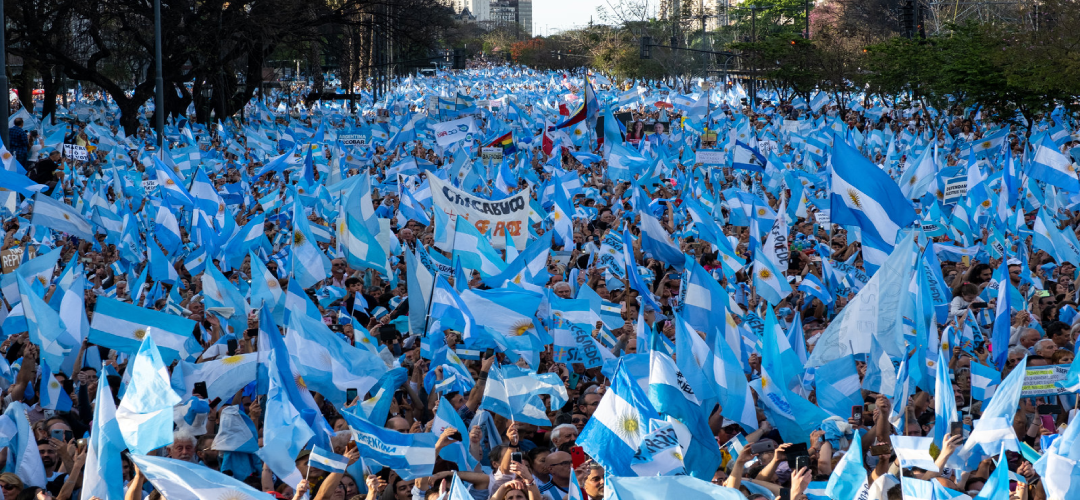A Political Earthquake
November 25, 2023 | Expert Insights

In a historic turn of events on November 19, 2023, Argentina witnessed a seismic shift in its political landscape with the election of Javier Milei as the new president.
A far-right libertarian economist, Milei's victory marked a departure from the country's traditional centre-left political trajectory.
Background
As Argentina approached the 2023 election, the nation found itself at a critical crossroads, grappling with an array of severe economic challenges that had accumulated over time. High inflation rates, currency depreciation, and a mounting debt burden cast a looming shadow over the Argentine populace. The economic recession, characterized by declining economic activity and a shrinking GDP, had led to rising unemployment and a pervasive sense of financial instability. Inflation, in particular, soared to alarming levels, eroding the purchasing power of citizens and compounding the hardships individuals and families face.
Against this backdrop, the 2023 election became pivotal for the nation's trajectory. The choice presented to voters was not merely a selection between political candidates but a decision between divergent economic philosophies. On one side stood Javier Milei, advocating for a market-oriented approach, emphasizing reduced government intervention and fiscal responsibility. On the other side was Sergio Massa, embodying the traditional Peronist focus on social welfare, emphasising government support and intervention to address economic disparities.
Mr. Javier Milei, a former economist and professor, emerged as a rank political outsider with a compelling anti-establishment message and staunchly libertarian views. His campaign gained momentum as he tapped into the disillusionment of a large segment of the Argentine population grappling with economic challenges, high inflation, and political gridlock. Milei's popularity surged due to his unconventional campaign tactics, strong social media presence, and promises of radical economic reforms. His diverse base of supporters, including young people and middle-class professionals, signalled a desire for a break from the traditional political establishment.

Analysis
At the heart of Argentina's electoral process is a distinctive feature that has shaped its democratic landscape since 1912 – mandatory voting, known as "voto obligatorio." This legal mandate requires all eligible citizens over 18 to participate in national elections, reflecting a commitment to fostering high voter turnout and promoting civic engagement.
Proponents of mandatory voting highlight its success in consistently achieving participation rates that surpass those of many developed democracies. The legal obligation to vote is seen as a powerful tool to encourage citizens to exercise their civic duty, contributing to a robust and representative democratic process. Moreover, the system aims to ensure that a broad spectrum of voices is heard, fostering inclusivity by compelling individuals from diverse backgrounds and socioeconomic groups to participate actively in the electoral process.
However, the mandatory voting system has not been without its critics. Detractors argue that it encroaches upon individual freedom by denying citizens the option to abstain from voting if they choose to do so. This criticism extends to concerns about the potential for inflating the number of invalid votes, as individuals may cast ballots without genuine interest or conviction.
The debate surrounding mandatory voting reflects the delicate balance between civic duty and individual liberty. While it has undoubtedly contributed to high voter turnout, the ongoing discourse questions whether the benefits of increased participation come at the cost of restricting the individual's freedom to choose their level of political engagement.
In the context of the 2023 election, the mandatory voting system played a significant role in shaping the electoral landscape. It ensured that a broad cross-section of Argentine society participated in deciding the nation's future, amplifying the significance of the choice between Milei's market-oriented approach and Massa's Peronist vision. As Argentina moves forward under the leadership of President Javier Milei, the interplay of economic policies and democratic mandates will continue to shape the nation's trajectory, with the repercussions of the 2023 election extending far beyond its immediate aftermath.
Javier Milei's election as president marked a significant shift in Argentina's economic direction. His proposed policies, characterized by substantial tax reductions, decreased government intervention, and a strong emphasis on a free-market economy, have the potential to reshape the nation's economic landscape. Advocates argue that these reforms could stimulate economic growth, attract investments, and address the persistent inflation and financial instability plaguing Argentina.
However, these bold economic measures are not without their challenges. Milei's policies are anticipated to face resistance from various factions within Argentina. Critics argue that such drastic changes might exacerbate existing social and economic inequalities, posing potential risks to vulnerable segments of society. The push for a free-market economy, while promising increased efficiency, could raise concerns about potential corporate dominance and the impact on workers' rights.
Milei's victory generated a spectrum of reactions on the international stage. Some expressed concerns about his far-right ideology, fearing it could deepen Argentina's social divisions. The international community, particularly those focused on human rights, closely watches Milei's presidency, wary of potential policies that may infringe upon individual liberties or exacerbate societal inequalities.
Conversely, some applauded Milei's commitment to economic reform. The prospect of a market-oriented approach appealed to those who believe such policies could bring stability and prosperity to Argentina. Advocates for free-market principles saw Milei's election as a potential catalyst for economic revitalization and an opportunity to attract foreign investments.
However, concerns were voiced about the potential destabilization of the region due to Milei's far-right policies. Latin American countries, already grappling with their own economic and political complexities, observed the events in Argentina with a mixture of curiosity and caution. The fear of regional instability prompted some leaders to express reservations about Milei's radical economic approach.
The varying stances exhibited by leaders in neighbouring countries underscore the complex landscape of shifting political dynamics in Latin America. While some congratulated Milei and expressed hope for a productive regional relationship, others warned about the potential consequences of his economic ideology on the broader geopolitical stage.
Assessment
- The impact of Milei's presidency, both domestically and internationally, remains uncertain. The coming years will reveal whether his economic reforms bring the promised stability and prosperity or if they encounter significant challenges and resistance within Argentina and beyond its borders.
- The ripple effects of Milei's election resonated throughout Latin America, a region known for its intricate political dynamics. Some nations viewed Argentina's shift towards a more market-oriented approach as a positive development, presenting an opportunity for the country to break away from its historical economic challenges.
- Concerns were voiced about the potential destabilization of the region due to Milei's far-right policies. Latin American countries, already grappling with their own economic and political complexities, observed the events in Argentina with a mixture of curiosity and caution. The fear of regional instability prompted some leaders to express reservations about Milei's radical economic approach.








Comments